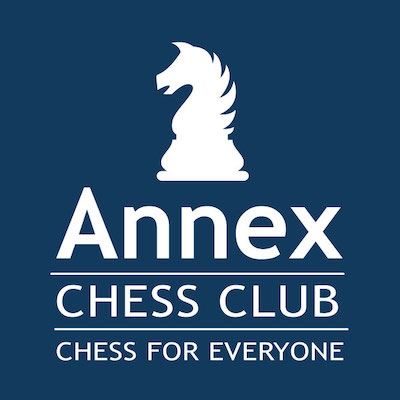ANNEX CHESS CLUBChess For Everyone! |
Keeping Score (Recording The Game)
At the top of your scoresheet you will see a number of fields. You do not need to fill all of them in, but at minimum the following information must be included:
- the name of the event;
- the date;
- round, board number and tournament section (i.e. round 3, board 26, U1400 section);
- the full names of both players. (First names are not enough!)
Without this information, an arbiter may not be able to tell when a game was played, or who the participants were, which can obviously cause problems. (We have received scoresheets where the only identifying information was one player's first name! Who did you play, Mark?! Needless to say, more detail would be helpful!)
Recording Moves
Players must write down all moves in the game, legibly and accurately. White’s moves are written on the left, Black’s on the right. The combination of White’s move and Black’s response is considered one move, or play.
Standard (algebraic) chess notation is very simple to learn, and admirable in its efficiency. If you do not know anything about reading and writing chess notation, this Wikipedia article is very thorough.
Disambiguation
One of the most common errors in recording a game is being unclear. Often two pieces of the same kind can arrive on the same square. It is important to specify which piece is being moved.
Imagine that you have connected rooks on the back rank on a1 and f1, and you move the rook on the a1 to e1. Writing Re1 is not enough, because either rook could reach e1, and we don't know which one you meant! Therefore we specify: Rae1 indicates that the rook on the a-file was moved.
Wherever possible, we use the file-letter to specify a piece, like Nbd7 (the knight on the b-file moves to d7).
If two pieces are on the same file, we can specify which one we mean by using the number of the rank. For example, Black has knights on d7 and d3. Both can capture on e5. We would write N7xe5 to indicate that the d7 knight was moved.
Draw Offers
Players should note draw offers using the symbol (=).
Recording Results and Submitting Scoresheets
When the game is done each player must record the result on their scoresheet.
Both players should quickly review both scoresheets to see that they agree, and fix any errors.
On ACC’s scoresheets you can tick the appropriate box at the bottom (White won, Draw, Black won.)
Also, you can write 1-0 to indicate a win for White, 0-1 for Black wins, and 1/2-1/2 (or just 1/2) for a draw.
Players must sign both scoresheets. (For young players, initials or a printed name is enough.) The top (white) copy of the scoresheet is club property and must be submitted to the arbiter, and the bottom (yellow) copy may be kept by the player.
Keeping Score Is A Duty
In a classical (i.e. slow) tournament, each player is required to keep score.
The typical rhythm for keeping score is: 1) make your move; 2) touch your clock; 3) record your move.
After your opponent moves, it's best to record the move right away so you don't forget to do it.
Players are not allowed to fall behind in keeping score.
If your opponent is not keeping score, they are gaining a small time advantage with every move, which is unfair to you. If you notice this, you may summon an arbiter. The arbiter shall give a warning to the opponent, and, on that player’s time, insist that they catch up by referring to the other score sheet.
We keep score for several reasons.
- the club (and sometimes CFC or even FIDE) needs a record of the game.
- you need an accurate record of the game in order to be able to claim a draw, resolve a dispute, or claim an illegal move.
- you should have a record of your games for analysis. Studying your own games is one of the best ways to improve as a chess player.

